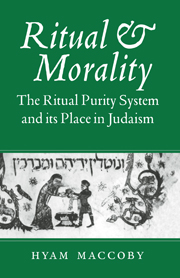Book contents
- Frontmatter
- Contents
- Preface
- Acknowledgments
- List of abbreviations
- 1 The sources of impurity: the human corpse
- 2 The corpse in the tent: an excursus
- 3 The sources of impurity: menstruation
- 4 The sources of impurity: childbirth: the zabah and zab
- 5 Normal emission of semen
- 6 Animals and purity
- 7 Impurity and sacrifices
- 8 The Red Cow: the paradoxes
- 9 The Red Cow and niddah
- 10 Leprosy
- 11 The purification of the leper
- 12 Corpse and leper: an excursus
- 13 Ritual purity in the New Testament
- 14 Milgrom on purity in the Bible
- 15 From demons to ethics
- 16 Ritual purity and morality
- Appendix A The haberim
- Appendix B The rabbinic system of grades of impurity
- References
- Index of quotations
- General index
16 - Ritual purity and morality
Published online by Cambridge University Press: 24 November 2009
- Frontmatter
- Contents
- Preface
- Acknowledgments
- List of abbreviations
- 1 The sources of impurity: the human corpse
- 2 The corpse in the tent: an excursus
- 3 The sources of impurity: menstruation
- 4 The sources of impurity: childbirth: the zabah and zab
- 5 Normal emission of semen
- 6 Animals and purity
- 7 Impurity and sacrifices
- 8 The Red Cow: the paradoxes
- 9 The Red Cow and niddah
- 10 Leprosy
- 11 The purification of the leper
- 12 Corpse and leper: an excursus
- 13 Ritual purity in the New Testament
- 14 Milgrom on purity in the Bible
- 15 From demons to ethics
- 16 Ritual purity and morality
- Appendix A The haberim
- Appendix B The rabbinic system of grades of impurity
- References
- Index of quotations
- General index
Summary
Ritual purity forms part of the code of holiness, by which the Israelites were set apart as a ‘kingdom of priests’. Other parts of this holiness code are the rules about permitted and forbidden foods, the rules about the Sabbath and the festivals, the rules about the performance of sacrifices in the Temple. All these rules are laid down for Israelites alone. They are obliged to keep these rules, but non-Israelites are not obliged to keep them, and incur no blame for not doing so.
This sets up a somewhat paradoxical situation. The ritual laws are, in one sense, the most important elements in the religion; but, in another sense, they are the least important. They are the most important because they give the Israelites their identity; they are the least important, because the laws of morality, which Israelites share with the rest of humanity, take precedence over them. In every case where there is conflict between ritual and morality, ritual gives way to morality. This is true both in the biblical and the rabbinic context. The paradigm case for this is the incident when David and his men arrived at the shrine of Nob, and in dire emergency were fed the holy shewbread by the High Priest (I Sam. 21:1–7). The Talmud treats this as a case of morality versus ritual; the shewbread was of the utmost sanctity, and could normally only be handled by the priests; yet the preservation of human life took precedence over all sanctities.
- Type
- Chapter
- Information
- Ritual and MoralityThe Ritual Purity System and its Place in Judaism, pp. 193 - 208Publisher: Cambridge University PressPrint publication year: 1999



